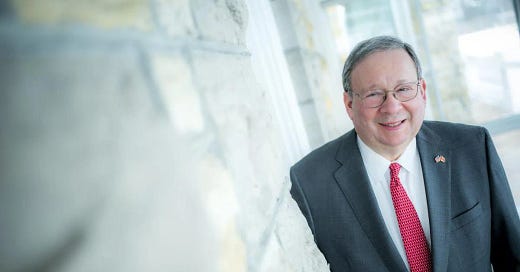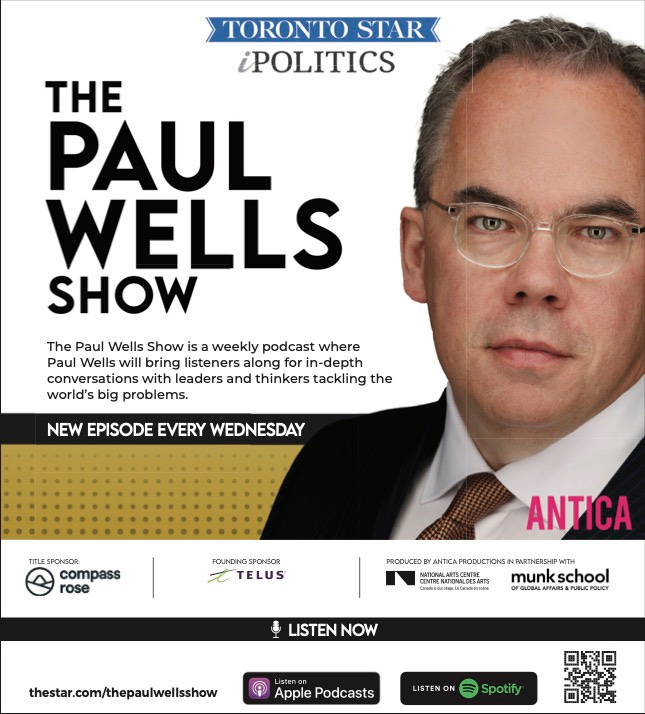Episode 1: Ambassador David L. Cohen
Plus thoughts on ambassadors, and neighbo(u)rs
A bunch of us are happy to bring you this conversation with David L. Cohen, the U.S. Ambassador to Canada. It’s the first in a weekly series of feature-length interviews with people around the world who are tackling the problems of the moment. Amb. Cohen gives great insight into the state of the cross-border relationship (bruised but hopeful), the promise of hydro power from Quebec’s north, and management tips from a little-league Tee-ball field in Philadelphia.
I have some of my own stories about Cohen, his predecessors, and the country I used to see across the river from my hometown. First, let’s help you hear the podcast.
Here’s how to find the episode. Listen for free — and please smash that “subscribe” button, which ensures you’ll hear future episodes and nudges our show up the league tables — at Apple Podcasts, Spotify, Amazon Music, or your other favourite podcast platform.
A few words of thanks.
Producing a professional podcast and getting it to the people is a complex enterprise. My first note of thanks is to my sponsors. Telus came in as Founding Sponsor; their support for us is in line with their sponsorship of other leading public-affairs podcasts, like The Curse of Politics. Our Title Sponsor is Compass Rose, one of Ottawa’s leading public-affairs consulting firms. Compass Rose’s founder Jacquie LaRocque is a force in Ottawa. Individual clients of hers are joining in as sponsors of individual episodes. I enjoyed talking with the folks from eBay after the Cohen interview.
There are lots of companies and organizations that don’t support work like this. You’d better believe I’m happy to tell you about the ones that do.
Border stories
In Sarnia you can look across the St. Clair River and see Port Huron, Michigan. As a kid I was in a drum and bugle corps that marched their 4th of July parade a couple of times. When I was older I’d borrow my dad’s car and drive across the border to shop at Full Moon Records, which had the good new jazz releases: Kevin Eubanks, Mel Lewis, the Yellowjackets.
A few times a year we’d drive right past Port Huron to Detroit, where I heard Sting and Dizzy Gillespie and took in a couple of Tigers games. You wouldn’t always have to show ID at the border. The trip across the Bluewater Bridge took less than 10 minutes.
Every part of that story got harder after 9/11. Liberal politicians and staffers in Jean Chrétien’s government were sometimes to vent about George W. Bush and, sometimes, about Americans more broadly. Paul Martin spent part of his 2006 campaign theatrically standing up to Bush, not that it helped much. Stephen Harper, to my surprise, took care to distance himself from Bush in small ways, following Chrétien’s advice that it never pays to seem too close to the Americans. Bush noticed and didn’t like it. Then Barack Obama became President and quickly triggered Harper’s fondness for grudges.
A brief thaw in this story of creeping estrangement set in when Justin Trudeau’s new government got to know the Obama crew. That didn’t last. Donald Trump’s presidency, and the worldwide rise of COVID protectionism, tremendously complicated all the longstanding irritants. Perhaps the latest surprise is that the Biden presidency hasn’t smoothed the waters much. And what I see on social networks, after I fret about this state of affairs on TV pundit panels, is that a lot of people don’t want to see the relationship improve.
Because some Canadians — not all — see the US as a broken country and they don’t want any of that mess to get on us.
This is the environment within which a succession of U.S. ambassadors to Ottawa have worked. David Cohen is the seventh occupant of the post that I’ve met. (Kelly Craft, Trump’s ambassador, would have been an eighth, but I exercised some ingenuity to avoid rooms she’d be in.)
It’s a strange job. Most of the Canada-US relationship ignores embassies. An ambassador can help facilitate executive-to-executive relationships and help crunch a few key files. The post has almost always been a reward for the president’s key fundraisers. If you get work done, so much the better.
Jim Blanchard, who was governor of Michigan when I was shopping at Full Moon Records, became Bill Clinton’s first emissary to Ottawa. Blanchard had a border state man’s preoccupation with border crossing. He helped arrange the pre-clearance system involving customs stations at key Canadian airports. And he helped broker Clinton’s outrageously undiplomatic, but probably helpful, intervention in the 1995 Quebec secession referendum.
The ambassador who stood out the most, in his personal style, was David Wilkins, the younger Bush’s second ambassador. Wilkins had been the speaker of the South Carolina House of Representatives. South Carolina is an early Republican primary state, and Wilkins helped Bush stomp John McCain there in 2000.
When I organized a fundraiser for a New Orleans performing-arts high school after Hurricane Katrina, Wilkins had me into his office to thank me by giving me a can of boiled peanuts, apparently a local delicacy back home. When you had lunch at Wilkins’ house, there was a lot of praying before you got to the food.
When Paul Martin’s campaign against Harper started to go badly and the Liberal leader tried running against Bush instead, Wilkins gave a speech at the Château Laurier to brush Martin back from the plate. It was a deeply political move, but Wilkins was a deeply political man, more so than most ambassadors. When Bush and Harper would meet, the PMO would, as is the Canadian way, tell Parliamentary Press Gallery reporters almost nothing. Wilkins would have a bunch of reporters over to his house and dish at length. Smart.
Bruce Heyman is a Chicago lawyer who raised serious coin for Obama and came to Ottawa to bask in the world’s greatest friendship. But Obama had suspended approval of the Keystone XL pipeline, and Heyman couldn’t believe how cold Harper’s Ottawa was. He was frozen out of high-level meetings for a year. The thaw after 2015 made Heyman eternally grateful. Heyman’s wife, Vicki, is a serious art collector who promoted some of the leading American artists at the National Gallery of Canada, and a proud Kentuckian who made sure the couple’s Kentucky Derby parties were well-stocked with bourbon. (My drinking days are behind me, so I stuck with Diet Coke.)
Not much reputation precedes Cohen to Ottawa. Few Canadians follow Philadelphia city politics, where as a young lawyer Cohen was chief of staff to the charismatic mayor Ed Rendell, a relationship recounted in this excellent book. Few followed his tenure at Comcast, the second-largest communications firm on earth, where Cohen was a right-hand man and fixer for the CEO. A company with $180 billion in assets does a lot of deals; Cohen’s staff has been amazed at how many senior Senators and members of Congress he knows, as well as state officials across the country.
He’s a serious person in an important job at a difficult moment. I’m glad he took some time to tell me how it’s going. I hope you enjoy our conversation.






Charming guy, but not a lot new there. There was an obligatory blame-dump on Trump (I thought he went a bit heavy on the "betrayal of trust" - when has it not been a bumpy relationship) then a steadily more confused discussion of some magical balancing of net-zero, oil-sands, hydro, carbon capture etc. Has he not noticed that Biden is out trying to buy extra oil from Venezuela and Saudi Arabia? After the pipelines were finally closed down? I doubt that anyone in Alberta or Saskatchewan will be comforted by his comments.
He was on steadier ground vis-a-vis "protectionism", but this is pretty well-trodden ground for US ambassadors.
Nice closer about the baseball.
I want somebody to get cranky on an American ambassador for the time the two Michaels spent under 7x24 lights in solitary. Quite a bit of it, after Biden took office. But with that as a lead-in to talking about how we both have serious problems with China and Saudi Arabia, where we find ourselves having to do business with them, but they really are not our friends.